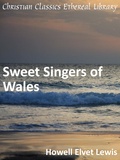Howell Elvet Lewis
Welsh minister, hymn-writer, poet
Biography
Lewis was born 14 April, 1860, the oldest son of the twelve children of James and Anna Lewis, at Y Gangell, near Blaen-y-coed, Carms. His father's wage as a foreman farm-worker at Pencraig-fawr was small and was supplemented by keeping a shop in the home at Pant-y-Waun. Howell's opportunities for learning were restricted. He learned the alphabet from the capital letters in his father's Bible and the home and the Sunday school nurtured him until he was eight when T.G. Miles opened a school in the chapel vestry. Howell soon showed his ability and he became a pupil teacher to his contemporaries. At no small sacrifice on his parentsf part, he was sent to the grammar school at Newcastle Emlyn when he was fourteen. He started to preach and was known as the eboy-preacherf. While there he was introduced to the Welsh strict metres,and to English literature. Two years later he passed the entrance examination to Carmarthen Presbyterian College.
In 1880 he accepted an invitation to the pastorate of Buckley chapel, Flints, a church that was Welsh in spirit but English in language. After four years there he went to Hull that was English both in language and in spirit. It was during this period that he turned his mind and heart towards Wales and to delight in its prose and poetry. He composed poems and essays that won prizes.
He returned to Wales in 1891 as minister of the English-language Park chapel, Llanelli. He was one of the editors of the Congregational hymnal, Y Caniedydd Cynulleidfaol, which was published in 1895. In 1898, he accepted a call to Harecourt, a well known church in London with connections with Cromwell and David Livingstone. After several requests, he yielded to the insistence of Tabernacle chapel, King's Cross, in 1904 and he ministered there until his retirement in 1940 when he went to live at eErw'r Delynf, Penarth and became a member of Ebeneser chapel, Cardiff.
His ministry at Tabernacle covered three periods: (a) The Revival (1904-14) when he devoted his talents to promoting and directing the religious enthusiasm of those years; (b) The Deterioration (1914-24). He drew up a ‘covenant’ with the members who had been dispersed because of the war so that their relationship with the church might be safeguarded; (c) The Depression (1924-40). Many Welsh people received help and work through Lewis during this difficult period and his message of hope was a great comfort to the many who had come to London to seek work.
His contribution to Welsh life and culture was acknowledged by the University, the Eisteddfod, the state and the church. He was the first person that the University of Wales honored with three degrees, M.A. (1906), D.D. (1933) and LL.D. (1949). The church also honored him. The London Missionary Board called him to its chair on two occasions, 1910 and 1922. He was elected national president of the Free Churches in 1926 and chairman of the Congregational Union of England and Wales in 1933.
Lewis was also fortunate in his home life. He married Mary Taylor of Buckley, in 1887. This was a happy marriage and they had seven children. However she died suddenly in 1918. He married Elisabeth Lloyd five years later but she was in poor health and died in 1927. By 1930 Lewis assumed that his public life was coming to an end as his eyesight had failed completely and traveling became impossible for him. However, Mary Davies, one of the members of King's Cross, came into his life. They married in 1930 and she gave him the opportunity to continue to minister in King's Cross and further afield. She enabled him to travel to preach and lecture until his death on 10 Jan. 1953. His ashes were interred in his home village of Blaen-y-coed.
